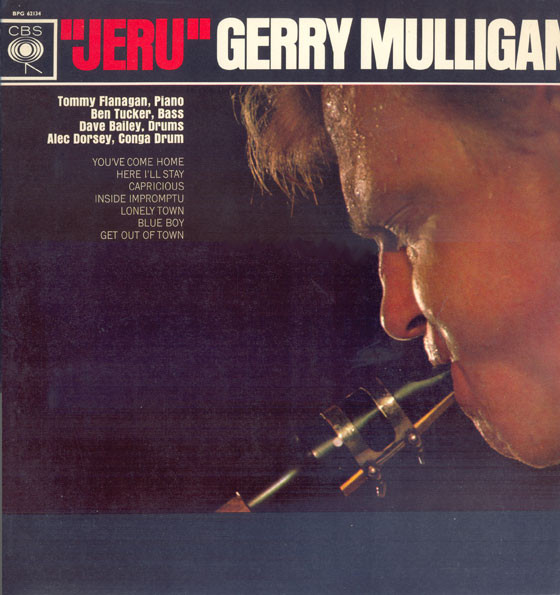The earliest memory I have of hearing jazz was a Schaefer Beer commercial that ran during Boston Red Sox games in the late fifties and early sixties. The ads began with a voice intoning the name of a celebrity booster, which in this case went, “Gerry Mulligan for Schaefer.” What followed was the sound of Mulligan’s baritone saxophone playing the melody of Schaefer’s familiar jingle. In the ad, Mulligan’s instrumental chorus was followed by someone singing, “Schaefer, is the, one beer to have, when you’re having more than one/Schaefer, pleasure, doesn’t fade, even when your thirst is done…” I knew the syncopated jingle, of course, but the sound of Mulligan’s horn is what really appealed to me. It turns out Schaefer used more than one jazz artist to promote its “most rewarding flavor,” and while I couldn’t find the Mulligan ad on YouTube, here are two of the several that came up. The first is by an unidentified jazz combo and chorus which may include trombonist Urbie Green.
The second is by Louis Armstrong.
Schaefer also provided music scholarships, and when I was a teen they sponsored annual summer concerts that I attended on Boston Common, Harvard Stadium, and Wollman Rink in Central Park. Between these venues, I have fond memories of seeing Ella Fitzgerald, B.B. King, Paul Butterfield, Taj Mahal, Nina Simone, and numerous others.

Through Schaefer’s scholarship program, pianist Steve Kuhn attended the legendary School of Jazz in Lenox, MA in 1959. In the interview I conducted with him a few years ago, he recalled, “I had just graduated from Harvard and Schaefer Beer gave some scholarships out, and they picked me. I went up to the Berkshires [from Newton, MA], it was really a three-week summer hang, and the faculty was the Modern Jazz Quartet, Gunther Schuller was there, George Russell, Bill Evans, Kenny Dorham, Max Roach. And the students included, aside from myself, Ornette Coleman, Don Cherry, Gary McFarland. It was great…an education in music, the jazz life and the jazz scene.” Two months later, after his arrival in New York, Kuhn rang up Dorham and landed his first major job with the trumpeter’s quintet at Turbo Village in Brooklyn. He made his recording debut with KD on the 1960 session, Jazz Contemporary.


Gerry Mulligan came to fame in 1952 with the quartet he formed in Los Angeles featuring trumpeter Chet Baker, but his earliest renown came as an arranger when Gene Krupa recorded his chart for “How High the Moon” in 1946. Mulligan was 19, with his ear to the ground, and the Krupa recording, made only two months after Charlie Parker recorded “Ornithology,” makes passing reference to Bird’s classic on “How High the Moon” changes. Mulligan went on to write charts for Claude Thornhill and Elliot Lawrence, and these were among the works that fired Miles Davis’s imagination and led to the Birth of the Cool sessions in 1949 and ’50, where seven Mulligan tunes and/or arrangements were among the landmark recordings.

(Bill Crow, Gerry Mulligan, Bob Brookmeyer)
Mulligan’s Concert Jazz Band, which we’ll hear in tonight’s Jazz a la Mode, represented something of a mid-career capstone for Jeru. Flush with cash after a successful decade leading small combos and playing minor roles in four movies, including I Want to Live and The Subterraneans, he and Bob Brookmeyer began putting together a big band for a 1960 engagement at Basin Street East and a recording session with Verve. Mulligan’s purpose was to play works by leading jazz composers and arrangers of the day, including George Russell, Johnny Mandel, Brookmeyer, Bill Holman, and School of Jazz alum McFarland. He deliberately named the outfit to distinguish it from dance bands, telling Leonard Feather that his would be “a real out-and-out jazz band.” And he established it as a different entity from the kinds of rehearsal bands that were stocked with studio musicians eager for a chance to blow. The CJB drew clear boundaries between section players and its handful of soloists, principally Clark Terry on trumpet, Brookmeyer on valve trombone, Gene Quill on alto, Zoot Sims or Jim Reider on tenor, and Mulligan on baritone and piano, all driven by the stellar rhythm section of Bill Crow and Mel Lewis.
Last week’s golden anniversary feature was the CJB’s Concert in Jazz, which includes Russell’s landmark composition, “All About Rosie,” two charts by McFarland, and Jeru’s beautiful ballad, “Summer’s Over.” Concert in Jazz concludes with “Israel,” the minor blues by John Carisi that was premiered on The Birth of the Cool. For the CJB, Carisi scored Miles Davis’s original solo for the band’s three trumpeters, Doc Severinson, Nick Travis, and Don Ferrarra. It feels like a fitting closer for Mulligan who, like his essential collaborator Brookmeyer, was a visionary with one foot planted firmly in the tradition, even when it was his own.

The CJB made one more recording for Verve, Gerry Mulligan ’63, which we’ll hear in tonight’s Jazz a la Mode. Clark Terry, who missed the previous session, was back on the band for this date, and guitarist Jim Hall, Brookmeyer’s former collegue in the Jimmy Giuffre Trio, was added at the trombonist’s urging. Gus Johnson spelled Mel Lewis, and while the result was less ambitious than Concert in Jazz, it’s spirited and beautifully-rendered, not least Brookmeyer’s arrangement of “My Kinda Love,” the CJB’s tribute to Jack Teagarden.
Shortly after this December 1962 session was completed, Norman Granz sold his label to MGM and the band’s financial support came to an end. It continued to work occasionally in New York, and near its end Thad Jones became a member of the trumpet section. Soon after the CJB closed shop, Jones, Brookmeyer and the rhythm section of Crow and Lewis re-opened as the Thad Jones-Mel Lewis Orchestra and began its decades-long engagement as the Monday night band at the Village Vanguard. That legacy continues down to the present day with the Vanguard Jazz Orchestra, and thus the spirit of the Concert Jazz Band lives on too.